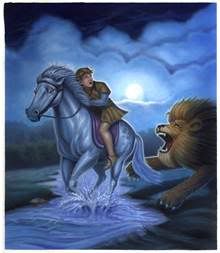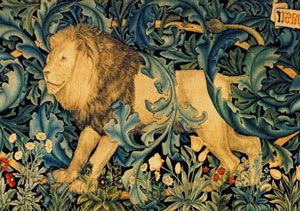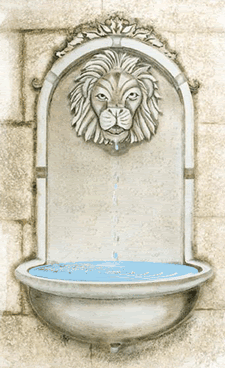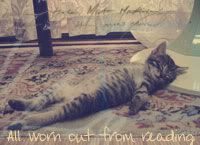I Was the Lion
Welcome to The Window. Your little place of peace and sanity away from all the election pundits, hoopla, pollsters, analysts, commentators, and shysters. I've posted a nice, long quote today. Relax, put your feet up and read, read, read. Ah, doesn't that feel better?

Once more he felt the warm breath of the Thing on his hand and face. "There," it said, "that is not the breath of a ghost. Tell me your sorrows."
Shasta was a little reassured by the breath: so he told how he had never known his real father or mother and had been brought up sternly by the fisherman. And then he told the story of his escape and how they were chasesd by lions and forced to swim for their lives; and of all their dangers in Tashbaan and about his night among the tombs and how the beasts howled at him out of the desert. And he told about the heat and thirst of their desert journey and how they were almost at their goal when another lion chased them and wounded Aravis. And also, how ever so long it was since he had had anything to eat.
"I do not call you unfortunate," said the Large Voice.
"Don't you think it was bad luck to meet so many lions?" said Shasta.
"There was only one lion," said the Voice.
"What on earth do you mean? I've just told you there were at least two the first night, and--"
"There was only one: but he was swift of foot."
"How do you know?"
 "I was the lion." And as Shasta gaped with open mouth and said nothing, the Voice continued. "I was the lion who forced you to join with Aravis. I was the cat who comforted you among the houses of the dead. I was the lion who drove the jackals from you while you slept. I was the lion who gave the Horses the new strength of fear for the last mile so that you should reach King Lune in time. And I was the lion you do not remember who pushed the boat in which you lay, a child near death, so that it came to shore where a man sat, wakeful at midnight, to receive you."
"I was the lion." And as Shasta gaped with open mouth and said nothing, the Voice continued. "I was the lion who forced you to join with Aravis. I was the cat who comforted you among the houses of the dead. I was the lion who drove the jackals from you while you slept. I was the lion who gave the Horses the new strength of fear for the last mile so that you should reach King Lune in time. And I was the lion you do not remember who pushed the boat in which you lay, a child near death, so that it came to shore where a man sat, wakeful at midnight, to receive you.""Then it was you who wounded Aravis?"
"It was I"
"But what for?"
"Child," said the Voice, "I am telling you your story, not hers. I tell no one any story but his own."
"Who are you?" asked Shasta.
"Myself," said the Voice, very deep and low so that the earth shook: and again "Myself", loud and clear and gay: and then the third time "Myself", whispered so softly you could hardly hear it, and yet it seemed to come from all round you as if the leaves rustled with it.
Shasta was no longer afraid that the Voice belonged to something that would eat him, nor that it was the voice of a ghost. But a new and different sort of trembling came over him. Yet he felt glad too.

He turned and saw, pacing beside him, taller than the horse, a Lion. The horse did not seem to be afraid of it or else could not see it. It was from the Lion that the light came. No one ever saw anything more terrible or beautiful.
Luckily Shasta had lived all his life too far south in Calormen to have heard the tales that were whispered in Tashbaan about a dreadful Narnian demon that appeared in the form of a lion. And of course he knew none of the true stories about Aslan, the great Lion, the son of the Emperor-over-the-sea, the King above all High Kings in Narnia. But after one glance at the Lion's face he slipped out of the saddle and fell at its feet. He couldn't say anything but then he didn't want to say anything, and he knew he needn't say anything.
The High King above all kings stooped towards him. Its mane, and some strange and solemn perfume that hung about the mane, was all round him. It touched his forehead with its tongue. He lifted his face and their eyes met. Then instantly the pale brightness of the mist and the fiery brightness of the Lion rolled themselves together into a swirling glory and gathered themselves up and disappeared. He was alone with the horse on a grassy hillside under a blue sky. And there were birds singing.
~C.S. Lewis, The Horse and His Boy, Chapter 11: The Unwelcome Fellow Traveller (1954)
________________________________
Take a Quiz: Which Narnia Book Are You?




3 Comment(s):
I just want to add a couple of comments first thing this morning. I have a special place in my heart for The Horse and His Boy, since it was the very first Lewis book I ever picked up. The only reason I decided to read it was for the title--I was a horse-crazy 12 year old at the time. (Oh my goodness I don't want to think about how many years ago that was!) Anyway, this book came along at a very difficult and tumultuous time in my life, and the Narnia series, which I immediately devoured after finishing The Horse and His Boy became my anchor of sorts through some tough times.
Many people might wince at the way Lewis has made a reference to the Trinity in this passage, but I love it. The fact that Aslan first reveals himself as only a Voice at first, then shows the three different parts of himself through the three different voices that speak "Myself", then the revealing of his physical presence as the Lion I think is a delightful way to briefly touch on this mystery. It's not preachy or heavy-handed IMHO, it's just there for the reader to appreciate or not, depending upon one's beliefs.
If you wish to lose yourself in analysis a bit further, here is an article from Mythlore that explores the depth of thought that Lewis put into the question of how Aslan should speak: "The Whole Art and Joy of Words: Aslan's Speech in the Chronicles of Narnia"Here's a brief quote: "His words, though child-like, are authoritative; his tone, though gentle, is on the whole unemotional. As for the content of what he says, he takes the initiative in beginning action, he defines what is reality, and he apportions praise and blame. Taken as a body of prose, there are few lapses displayed in Aslan's form of speech, a difficult enough feat in such a lean, spare style especially when it is embedded in a narrative with a fairly informal, conversational tone."
That's it for now...although I'm sure I'll think of more to say about this passage as soon as I hit the "Publish" button!
I hope you all are having a good election day.
That's interesting. I had never considered this as a reference to the Trinity. What always strikes me on reading this passage is the similarity of this answer to the one God gives Moses in Exodus 3 when Moses asks who he is to say has sent him, and God says "I AM WHO I AM. This is what you are to say to the Israelites: I AM has sent me to you."
Yes...I also had seen this as a reference to "I AM who I AM", but not the Trinity. But now that you bring it up...I can see it that way.
Post a Comment
<< Home